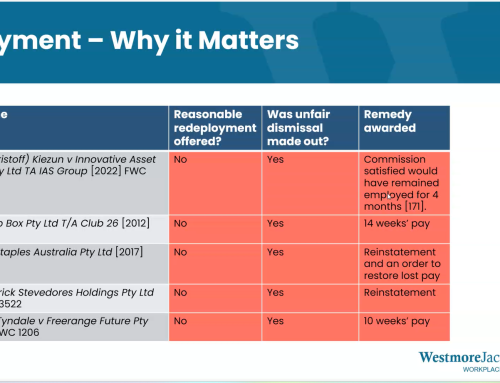The High Court recently upheld laws which effectively provide that Australian Public Service (“APS”) employees can be dismissed for anonymous out-of-hours political communication. The Court held that these laws are not unconstitutional.
In this article we discuss the recent High Court decision in Comcare v Banerji
Comcare v Banerji
Ms Banerji was employed at the Department of Immigration and Citizenship. During her employment she made some 9,000 anonymous tweets. With one exception, these were made outside working hours.
Many of these tweets were very critical of the Department, officials within the Department, and the Government’s immigration policy. Much of this criticism was in very harsh terms. Occasionally, the criticism was directed towards particular officials within the Department.
The Department eventually found out that Ms Banerji was the person behind these tweets. Consequently, it dismissed her pursuant to the Public Service Act 1999 (Cth) for failing to comply with the APS Code of Conduct.
After her dismissal, Ms Banerji lodged a workers’ compensation claim for psychological injuries caused by her dismissal. Comcare rejected that claim.
The matter ended up in the High Court, where Comcare and Ms Banerji agreed that she would be entitled to workers’ compensation if the sections of the Public Service Act under which she was dismissed were unconstitutional.
The sections of The Public Service Act under which Ms Banerji was dismissed
The Public Service Act sets out the APS Code of Conduct. Under the Code of Conduct, APS employees are required to uphold the “APS Values” at all times. These values include that the APS is apolitical and performs its functions in an impartial manner.
Under the Public Service Act, various sanctions can be imposed on employees who do not follow the APS Code of Conduct. These range from termination of employment to a reprimand (“the Restrictions”).
Ms Banerji was dismissed for failing to follow the APS Code of Conduct by acting in a political and impartial way. She argued the above laws were unconstitutional by operation of the implied freedom of political communication contained in the Constitution.
The Implied Freedom of Political Communication
The Australian Constitution does not protect free speech. However, it does set up a system of democratic government at the federal level where, among other things, members of the Commonwealth Parliament are democratically elected.
Broadly, the High Court has held that laws which unjustifiably burden political communication are invalid because they undermine that system of democratic government (as set up by the Constitution). This is known as the “implied freedom of political communication” (“Implied Freedom”).
A law will be invalid by reason of the Implied Freedom if it:
- burdens or restricts political communication; and
- does not pursue a legitimate policy objective in a proportionate way.
Laws that burden political communication are still valid if they pursue a legitimate policy objective in a proportionate way.
The Restrictions were constitutional
The Court unanimously held that the Public Service Act did burden political communication. However, the Court held that burden was justified because it pursued a legitimate policy objective in a proportionate way. Consequently, the Restrictions were constitutional.
The Restrictions pursued a legitimate objective
The Majority (Kiefel CJ and Bell, Keane and Nettle JJ) held that the Restrictions were seeking to establish an “apolitical and professional public service”. They held this was “unquestionably” a legitimate objective.
Consequently, the case turned on whether the Public Service Act’s restrictions on political communication pursued the goal of establishing an apolitical public service in a proportionate way.
The Restrictions pursued an apolitical public service in a proportionate way
The Court unanimously held that the Public Service Act pursued its objective in a proportionate way. Consequently, the Restrictions were constitutional.
Ms Banerji argued the law was disproportionate because it went further than was reasonably necessary to achieve its purpose. This was because Public Service Act could still establish an apolitical public service without sanctioning anonymous communications.
The Majority rejected that argument. They noted that anonymous communications could still be detrimental to the APS’s reputation of impartiality because the anonymous public servant’s identity could eventually be revealed.
The Majority also held that the burden the Restrictions imposed on political communication was not so heavy that it outweighed the importance of establishing an apolitical public service. The Majority played down the level of burden the Restrictions posed on political communication. They noted that breaching the APS code of conduct did not automatically result in an employee being dismissed.
Instead, employers select the appropriate sanction for a breach of the APS Code of Conduct. These range from a reprimand to dismissal. The Majority noted this reduced the level of burden on political communication. This is because decision-makers are required to act reasonably when making decisions under statute.
Additionally, the Majority noted that APS employees can challenge sanctions in various ways. APS employees can have non-dismissal sanctions reviewed by a Merits Tribunal or seek an unfair dismissal remedy under the Fair Work Act 2009 (Cth) (“FW Act”) if they are dismissed. Employees can also seek judicial review of the decision imposing the sanction.
Implications
This decision shows that legislative restrictions on the political speech of public service employees can be constitutional. Even if the laws restrict anonymous communication or communication which occur outside of working hours.
This decision does not consider the validity of limitations on the speech of private-sector employees. It is limited to public-sector employees.
Whilst the FW Act, and some States’ anti-discrimination legislation, prohibit discrimination on the basis of an employee’s political opinion, these protections may not confer substantial protection on public servants who breach statutory codes of conduct. Particularly given the narrow application of the FW Act’s protection of political speech in Rumble v HWL Ebsworth Lawyers [2019] FCA 1049.
Additionally, the FW Act’s protections of political opinion may only apply in states which protect discrimination on the basis of political opinion in their anti-discrimination legislation.
Adam Colquhoun
Principal
This article is general information only. It is not legal advice. If you need legal advice, please contact us.






